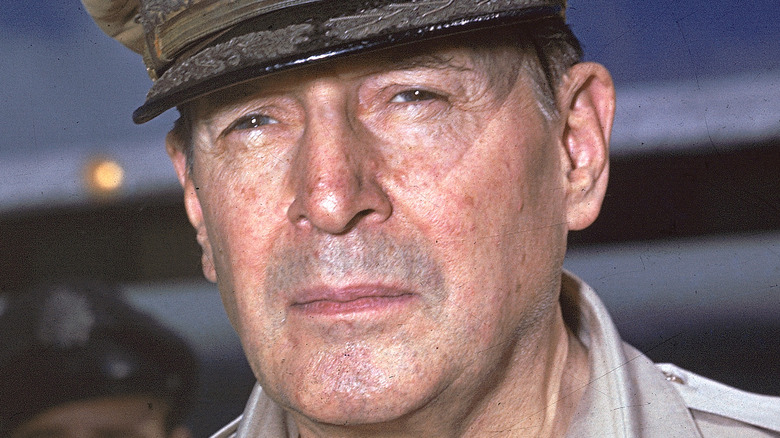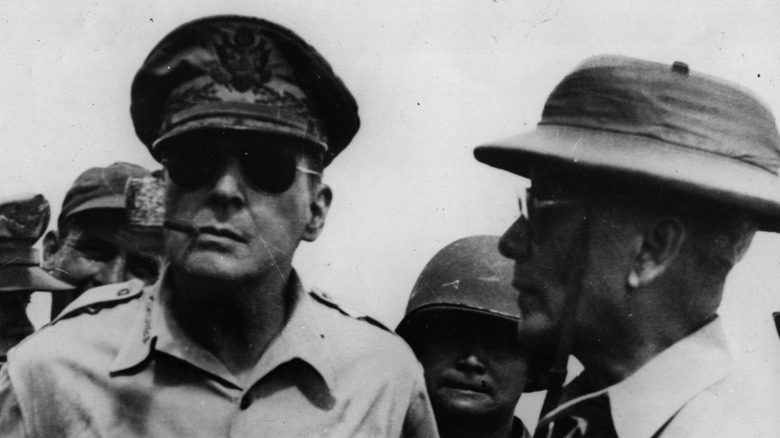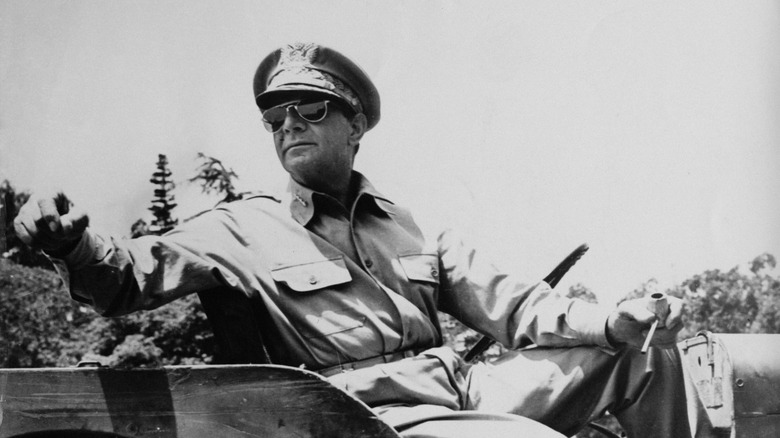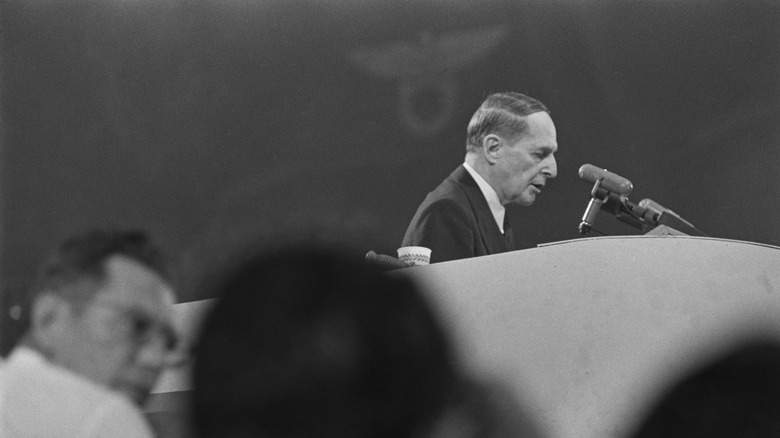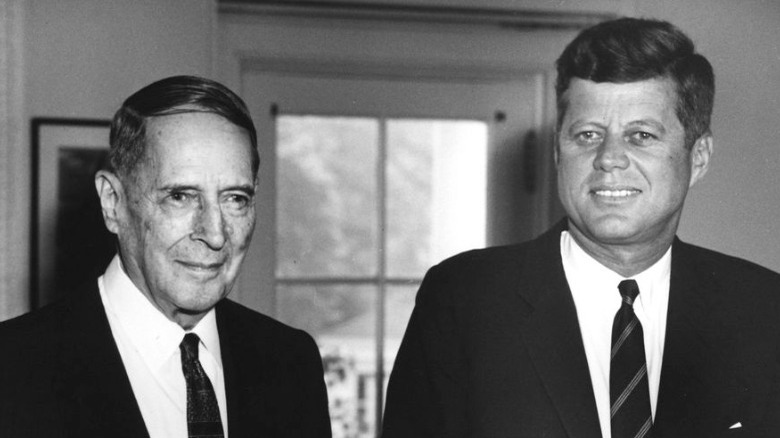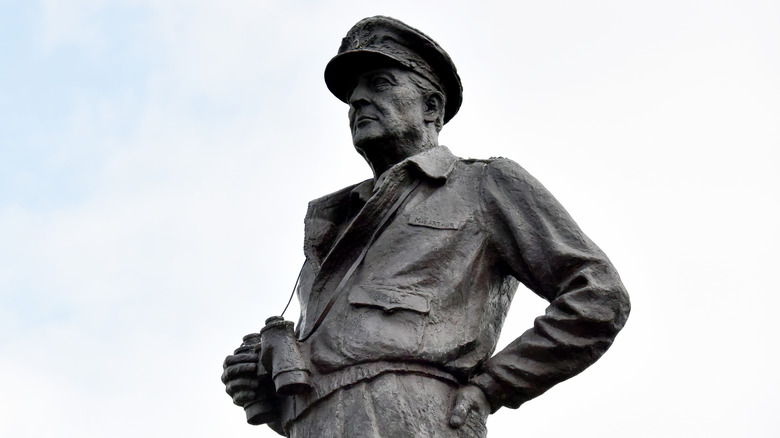Inside Douglas MacArthur's Words Of Warning To President Kennedy
On April 28, 1961, United States President John F. Kennedy was just a few months into his time in the White House. The previous day, he had been at the Waldorf Astoria Hotel in New York City to give a speech to the American Newspaper Publishers Association. In that speech, Kennedy discussed the importance of the press and how a decision made by the New York Herald inadvertently led Karl Marx to develop what would become the building blocks of Leninism, and Stalinism, and lead to the Cold War (via the JFK Library).
The next day, Kennedy had another appointment in the Waldorf Astoria, although this one was drastically different. Instead of reading carefully prepared remarks to a room full of newspapers magnates and reporters, the president had a quiet meeting in a 37th-floor suite with General Douglas MacArthur. The general was in his 80s by this point and met with the young president to discuss foreign policy matters. Kennedy took notes during this meeting which were preserved in the form of a memo that now resides in the collection of the John F. Kennedy Presidential Library and Museum in Boston. In the memo, it's clear that MacArthur — who after his World War II heroics had run afoul of President Truman during the Korean War — warned Kennedy about intervening in southeast Asia; doing so would lead to an unwinnable war. Many feel that had Kennedy not been assassinated a couple of years later, he may have heeded this advice, and the United States would have never gotten involved in the Vietnam War.
MacArthur in World War II
Douglas MacArthur was a well-known name in military circles even before World War II rolled around. MacArthur was a 1903 graduate of West Point and went on to lead the 42nd Division in France during World War I. Between the wars, he was the superintendent of West Point, Army chief of staff, and spent time as a field marshal in the Philippines, the first foray into a part of the world where he spent a large chunk of his later life and career.
Having experience in the Pacific on his resumé, MacArthur was put in charge of American forces in the Far East. According to History, the general was forced to flee the Philippines with his family and close staff members in 1942 while the Japanese took over the island nation, but he famous promised that he would be back to liberate the country, per History.
MacArthur was true to his word and liberated the Philippines in 1944. The next year he was on board the USS Missouri to accept Japan's surrender, which brought World War II to an end. From there, MacArthur was put in charge of overseeing the demobilization of Japan's military, worked to rebuild the country's economy, and helped the nation rebuild after the war.
The Korean War and falling out with President Truman
MacArthur was hailed as one of America's heroes after World War II, but the outspoken — and in some observers' eyes, egotistical — general wound up butting heads with President Truman during the Korean War. According to Britannica, MacArthur was put in charge of United Nations forces on the Korean Peninsula. Initially, MacArthur's forces landed in Korea and quickly presented a problem for North Korean forces who scattered. But one month later, Chinese forces — allies with North Korean — forced MacArthur's troops south.
It wasn't long before MacArthur once again launched offensive endeavors to regain lost territory on the peninsula. He wanted to go a step further — by bombing mainland China and using forces from Taiwan to help the war effort — but Truman didn't want to do this. According to History, Truman aimed to keep the Korean War limited to the Korean peninsula. The two were public about their disagreement, and on April 11, 1951, Truman dismissed MacArthur due to insubordination. The public reaction was anger toward Truman for getting rid of the highly decorated leader, but Truman saw it as a way of avoiding World War III.
MacArthur in the United States
Despite his messy dismissal from Korea, MacArthur received a hero's welcome when he returned stateside. However, MacArthur didn't go down quietly. Just over one week after his dismissal, the general delivered an address to Congress — which was also televised — in which he harshly criticized the president's policies concerning the war in Korea (via History).
MacArthur and his wife moved into the Waldorf-Astoria Hotel in the early 1950s, the place where he later met with President John F. Kennedy. MacArthur was still so popular with the public that there were calls for him to run for office in the 1952 presidential election on the Republican ticket. The Republicans did choose to run a war hero, just not Douglas MacArthur. Instead, General Dwight Eisenhower was the party's nominee and he wound up taking office and serving two terms in the White House.
While he didn't make his way to Pennsylvania Avenue, MacArthur took a job in the private sector as the chairman of Remington Rand, a company that manufactured electrical equipment. Still, his opinions on military matters and foreign policy were highly respected, which is why President Kennedy decided to pay him a visit in 1961 (via The American Conservative).
The meeting
According to The American Conservative, some of Kennedy's advisors weren't fans of MacArthur and not particularly fond of the Democratic president having a sit-down — especially one covered in the news as this one was — with the former, almost-Republican presidential nominee, who had ruffled fellow Democrat Truman's feathers a decade earlier. However, Kennedy had served in the Pacific during World War II and had immense respect for MacArthur.
The week before Kennedy's meeting with MacArthur, he had just faced a blunder with the Bay of Pigs invasion, in which U.S.-backed anti-Castro Cuban exiles were swiftly defeated. This came up during their meeting, and while MacArthur acknowledged the failure was a substantial problem, it wasn't all Kennedy's fault. MacArthur felt the blame should have been placed on Kennedy's predecessor, Dwight Eisenhower. Kennedy was just a few months into his presidency when the invasion occurred, and MacArthur felt it may have been possible that Kennedy had been set up by Eisenhower and the Joint Chiefs of Staff, who he said should have known better than to move forward with the Bay of Pigs Invasion.
MacArthur and Kennedy also discussed the growing situation in southeast Asia, specifically in Laos and Vietnam. Communism was leaking into these areas, and members of Congress wanted Kennedy to send U.S. troops there to put a stop to it. MacArthur disagreed, saying, "Anyone wanting to commit ground troops to Asia should have his head examined."
Kennedy's memo
President Kennedy was really paying attention during his meeting with General MacArthur and jotted notes, which were then typed up into a memo, currently part of the collection at the John F. Kennedy Presidential Library and Museum. According to The American Conservative, some historians see this memo as something that points to one of the biggest "what if?" questions in United States history. Had the president not been assassinated in 1963, how would history differ from the way it truly played out?
The memo with advice about not getting involved in southeast Asia that came directly from MacArthur — a man with experience, as well as the president's utmost respect — is often pointed to as a tentpole for the argument that had Kennedy lived, he would have tried his hardest to keep the United States from getting involved in what turned out to be an unwinnable war.
The two met again after their discussion at the Waldorf Astoria, with MacArthur visiting the White House in July 1961. However, Kennedy was dead two-and-a-half years after their first meeting, and MacArthur died in 1964, per Britannica. With both of them out of the picture, the United States opted not to heed MacArthur's warning to "never fight a land war in Asia."
